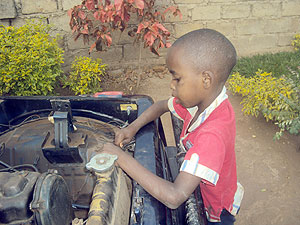If any parent was asked what feelings he or she would have if his or her child became a star, we would get a similar obvious answer- I would feel fantastic!


If any parent was asked what feelings he or she would have if his or her child became a star, we would get a similar obvious answer- I would feel fantastic!
But ask yourself how much you are doing to develop the talent of your child, to be a star. Have you done anything in this respect? If not, better think twice and avoid lame excuses.
The majority of parents in Rwanda and indeed in most Sub-Saharan Africa do not care or are naive about developing their children’s talents, at any development level.
Christine Kayitesi, a parent working with Nyarugenge District, sees failure to develop children’s talents as a great societal problem in the society.
She further laments that the biggest problem is that parents do not know how to go about developing children’s talents, and neither do the schools in which they study help them.
"How can you identify your children’s talent when you don’t even know yours? It is unrealistic. The schools we have also follow the classical curriculum, to teach subjects that don’t necessarily interest learners.”
Jean Baptiste, 57, a retired teacher in Rwamagana, says that parents in this part of the world only rely on formal schools to shape their children.
"You know it is all about gambling...you send a child to school and when he or she meets his or her talents there, you praise the Lord. The school teachers too teach according to the curriculum and wait for luck to produce quality talents,” he reflects.
What parents should do to improve children’s talents
It is a lifetime obligation for parents to help their children discover and develop their talents. Some successful parents emphasise that parents have to assist their children become themselves - to discover their passions and their abilities and to put them to use in making the world a better place.
According to Hamed Badala, a senior motor mechanic based in Rwamagana, the process begins with very young children. Sensitive parents notice children’s preferences and respond to them helpfully.
Badala, a father of 3, is astonishingly developing one of his children Osama Bin Badala, 6, into a professional motor mechanic, at such a tender age.
"If a baby loves to shake things, the parent should provide a rattle. When an infant likes to play with motor vehicle cartoons, provide him or her with a spanner. When a child wants to draw things, the parent should provide finger paints, markers, and crayons,” he advises.
Badala further says that he has so far identified his son’s talent as a mechanic. The child goes to school every morning, and as soon as he reaches home, he joins the father in motor repair under a shed just adjacent to their house, a typical like father like son scenario.
"Life is rich when we learn to discover our talents, develop them, celebrate them, and use them to help other people. What I am doing is exactly what my father, who was a mechanic, too did to me - expose the child and just leave him to discover,” Badala reflected.
"I simply enjoy the way he does it, when I am opening a nut here; he is also opening another in the other side. I can see that after primary school, he will be joining high class technical school. In fact he will have mastered the practical part of it...he is a child who will not bother me much.”
The first thing parents can do is help their children explore and discover various talents. Notice the things your child likes, comment on them. Loving parents can be very helpful social mirrors by giving specific, positive feedback to their children.
Osama Bin Badala, a primary one pupil at Rwamagana Islamic School, says he is the happiest child in the community because his father allows him to manipulate various things on motor-vehicles.
"My father is great. Unlike others, he allows me to touch engine parts when he is working on vehicles. This has made me gain experience, and I can now remove a radiator very fast and easily. I also fix car lamps and indicators,” he said while laughing.
Osama should thus be an example of a child whose parents have developed to the satisfaction of his talents; by simply giving him the right to explore his environment. He says that it all started as a game but is now viewing it as an interesting job.
"I didn’t know what I was doing until I realised that I am really good at mechanics. This was when my father started praising me for opening a radiator perfectly. What was a game turned into business,” he said.
Valuing children’s play
The importance of children’s play is viewed differently by different people in various societies. Some view it as frivolous pastime, while others see it as at best, useful to let off steam.
As a Primary One pupil, Osama shows that playing is an essential part of growing up. Through play children learn about the world around them. It is, therefore, important to understand how valuable toys and play are in the development of a child.
Children with access to a wide range of well-selected toys, for example, are more likely to be stimulated. Studies find that they reach higher levels of intellectual development, regardless of their sex or social class.
The same experience the child gives above of playing with spanners, shows that toys that stimulate mental development are appropriate for the child’s abilities, responsive to the child’s movements and provide feedback when manipulated.
Whether playing alone or with others, quietly or with enthusiasm, play is the way children explore their world and create imaginary ones.
Ends


